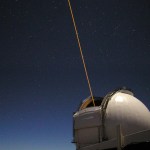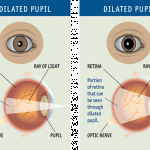"But certainly the laser proved to be what I realized it was going to be. At that moment in my life I was too ignorant in business law to be able to do it right, and if I did it over again probably the same damn thing would happen." -Gordon Gould, inventor of the laser
You're used to the iconic image of an observatory's dome surrounded by a dark sky. From within, a telescope peers up at the heavens. And with a huge amount of light-gathering power that dwarfs a fully dilated human eye, we can use this tremendous tool to peek into the dark depths of the Universe.
Image credit: Fort Lewis…
adaptive
"I went into a clothing store, and the lady asked me what size I was. I said, 'Actual'. I'm not to scale." -Demitri Martin
When you look out at the Universe, what you can see is limited, at the most fundamental level, by the size of what you look with. This is why you can see dimmer objects at night -- when your pupils are dilated -- than you can when your pupils are constricted.
Image credit: National Institute of Health.
This same principle that applies to your eyes applies to telescopes as well. As telescopes have grown in size, so has our ability to see deeper into the Universe, as…

